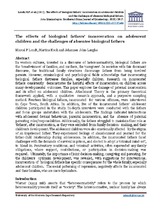The effects of biological fathers’ incarceration on adolescent children and the challenges of absentee biological fathers

View/
Date
2017Author
Londt, Marcel P.
Kock, Martine
John-Langba, Johannes
Metadata
Show full item recordAbstract
In western cultures, invested in a discourse of heteronormativity, biological fathers are the ‘breadwinners’ of families, and mothers, the ‘caregivers’. In societies with this dominant discourse, the traditional family structures discourage fathers from being involved parents. However, criminological and psychological fields acknowledge that incarcerating biological fathers distresses families, especially children. Research on incarcerated fathers consistently demonstrates the harmful effects of incarceration on children across many developmental outcomes. This paper explores the damage of paternal incarceration and its effect on adolescent children. Attachment Theory is the primary theoretical framework applied, with a qualitative research approach, and a purposive sampling method. Fourteen biological fathers, incarcerated for various offences, were interviewed in Cape Town, South Africa. In addition, five of the incarcerated fathers’ adolescent children participated in the study. In-depth interviews were conducted with the fathers and focus groups undertaken with the adolescents. The findings indicated intersections with adolescent deviant behaviours, parental incarceration, and the absence of paternal parenting roles/responsibilities. Additionally, the fathers struggled to maintain their role as ’fathers’, after incarceration, as they were excluded from family decision- making, and their children’s development. The adolescent children were also emotionally affected by the stigma of an imprisoned father. They experienced feelings of abandonment and yearned for the father-child relationship during adolescence. In addition, the incarcerated fathers faced challenges with the demands of survival in prison, and elected to adopt a ‘criminal mind-set’, to blend in. Penitentiary conditions, and ‘criminal’ activities, often superseded any family obligations, where support, contributions, or participation in decision-making was required. Ultimately, the importance of joint decision-making, caregiving and parenting, for the children’s optimum development, was revealed, with suggestions for interventions. Incarceration of biological fathers has specific consequences for the whole family, especially adolescent children. The social patterning of repression, negatively affects the incarcerated and their families, who are mere bystanders.
